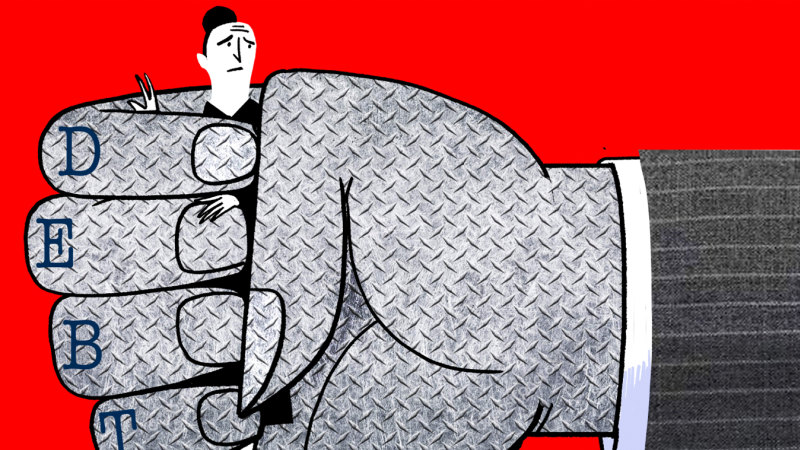Save articles for later
Add articles to your saved list and come back to them any time.
Last Thursday, the Federal Court delivered judgment on a government decision. It concerned a refugee, Mostafa Azimitabar. Flown from Papua New Guinea to receive urgent psychiatric care, he lived for over a year “primarily in a hotel room with a window that would only open 10 centimetres, and for most of the time without access to an outdoor area to breathe fresh air or feel the sun on his face”. This, the judge said, showed a lack of “ordinary human decency”.
The next day, the robo-debt royal commission handed down its report. The government’s approach was again condemned: it was, found the commissioner, crude and cruel. Victims spoke of their “sheer terror”, of being unable to eat, “always thinking about the debt”.
Illustration by Simon LetchCredit:
Many Australians are accustomed to thinking of government as a largely benevolent force. The Azimitabar judgment and the robo-debt report give you a small taste of just how frightening the power of a government can be when it is directed against you.
The robo-debt commissioner, Catherine Holmes, has produced something enduring: surely few documents in our history are so broadly damning of the mechanics, culture, competence and conscience of a government, demonstrated through a vast accumulation of specific failures.
To read through the report’s recommendations is to be struck by how obvious they are. Welfare recipients should not be shamed. Vulnerable people should get face-to-face support. Governments should check if new programs are legal. Governments should not use trickery to avoid facing up to legal advice. Governments should not be able to designate documents as secret on a whim. Frontline staff should be consulted on new programs. Peak advocacy bodies should be consulted on large changes. The public service should be properly trained.
The sheer basicness of this list decisively reinforces the terrible verdict on the previous government. But given that government is now gone, the far more important picture sketched by these recommendations is of a style of government that, over recent decades, has become the norm in much of the developed world.
That is one in which political aims are the first priority; transparency is reflexively treated as a bad thing; consultation and collaboration are perceived as weakness; everybody outside of your political party is seen as a potential enemy; budget savings and systems are seen as more important than people; and in which the public service has internalised much of this thinking.
It is also an environment in which much of the media has too often abdicated its supposed role as watchdog on the powerful, to instead become yet another tormentor of the powerless.
How did we get here?
That is too broad a question for a report into a single scheme, but the commissioner offers a crucial hint when she writes in her preface that the effectiveness of her recommendations will depend on two things. The first is that only the government of the day can really prevent a repeat: in the end leaders must set the right tone.
The second is this: politicians must stop the “easy populism” of demonising welfare recipients. The fact that Holmes puts this in her preface underlines its importance. It is not that welfare recipients were demonised and government failed to govern. The demonisation of welfare recipients is what made government failure possible. It was what made the awful program politically desirable; it was what allowed the government to persist for such a long time with minimal political pain; it was what ensured the cruelty of the program did not get the media coverage it should have.
It is perhaps worth asking: if the scheme had not turned out to be illegal – if Victorian Legal Aid had not forced the government to admit this – would most of us have noticed the cruelty at all? It is a complex question because in the case of robo-debt what made the scheme cruel – income averaging – was also what made it illegal. Still, last week offered a direct comparison. In the Azimitabar case, the government also acted cruelly. But in that case, its actions were declared lawful. There will be no reckoning.
One final point. Before the robo-debt report landed, last week’s political discussion was dominated by the Indigenous Voice to parliament. “Discussion” is generous. Much of it was awful or deceptive. There was the ad in the Australian Financial Review showing Yes campaigner, Thomas Mayo, dancing for money, which, as NSW Liberal MP Matt Kean pointed out, recalled the caricatures of the Jim Crow era. (Its owners, who also own this masthead, later apologised.) There was Peter Dutton’s assertion that the prime minister’s obsession with the Voice was the reason prices and mortgages were rising; and that prices were rising at companies such as Bunnings because they had donated to the Yes campaign.
There are two strains of argument here. The first, showcased in the ad, is a racist demonisation of high-profile Indigenous people campaigning for a Yes vote. The second, present in both the ad and Dutton’s rhetoric, is an opposition being set up between the family budgets of most Australians and the Voice.
This should sound disturbingly familiar. When Holmes described the “easy populism” of demonising welfare recipients, she characterised it like this: a “narrative of taxpayer versus welfare recipient”. The No campaign is casting Indigenous campaigners in the role recently occupied by welfare recipients: hands out, costing the rest of us.
This is bad enough in isolation. But Holmes’ point goes to a far broader problem. Rather than engaging in the serious and often tedious work of governing – of working out how to implement policies and programs that will make a (positive) difference to people’s lives – too many politicians are guided by a stupider question: what policy can we come up with that will allow us to fight a populist battle against an easily vilified enemy?
Having watched the robo-debt fallout, much of our media and political class have vowed “never again”. But problems never recur in exactly the same form. Trivialising important issues? Demonising people who have suffered enough? Reducing government to a game of goodies and baddies? It’s already happening again in the Voice debate.
Laws and processes can be fixed. Cruelty is a far more persistent strain in Australian politics. That does not look like it is about to change.
Sean Kelly is a regular columnist and a former adviser to Julia Gillard and Kevin Rudd.
The Opinion newsletter is a weekly wrap of views that will challenge, champion and inform your own. Sign up here.
Most Viewed in Politics
From our partners
Source: Read Full Article


